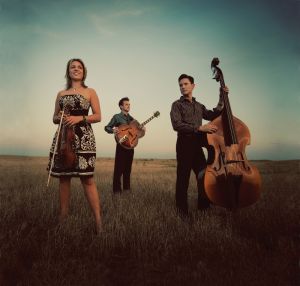Since their first recording in 1998, Austin-based Hot Club of Cowtown have grown to be the most globe-trotting, hardest-swinging Western swing trio on the planet. The first American band to tour Azerbaijan, they have opened stadiums for such artists as Bob Dylan and Willie Nelson and continue to bring their unique brand of Western swing to a wide range of festival audiences all over the world. But for guitarist Whit Smith, fiddler Elana James and bassist Jake Erwin, it has always been about staying true to their roots.
Remaining willfully out of the musical mainstream, Hot Club of Cowtown have created an international cult following for their sonic personification of joy and unique sound inspired by their namesakes: “Hot Club” from the hot jazz guitarist Django Reinhardt and violinist Stephane Grappelli’s Hot Club of France, and “Cowtown” from the Western swing influence of Bob Wills and His Texas Playboys.
Though Wills’ pre-WWII recordings have always been the fundamental inspiration for Hot Club of Cowtown’s repertoire and style, it has taken the band a dozen years to fully honor the King of Western Swing. A fortuitous tour in England in the spring of 2010 led them to London’s Specific Sound studio, where they spent two days recording a 14-song marathon of Bob Wills tunes. The result, What Makes Bob Holler, is a tribute to the American music icon, respecting Wills’ legendary music while putting Hot Club’s own signature on each song. “We have been meaning to make this album for a long time,” says James.
“This is music from the days when guys toured and sat on a bus with no air conditioning, no real food, for days. We heard a story of a fiddler the Wills band picked up in California and by the time they had driven to the Midwest, he was dead and nobody even knew his name. They pried his rigor mortis’d body off of the bus and left him under a lamppost somewhere in Kansas,” says James, “It was a different time. These guys were pretty hardcore.”
What Makes Bob Holler presents the most convincing evidence yet that Hot Club of Cowtown may be on to something. By digging even deeper into their roots and refusing to modernize, the band offers up one of their most exciting recordings to date. The disc is an imaginative pairing of obscure B-sides with some of Wills’ most popular work. Tunes like “Big Balls in Cowtown” and “Stay All Night” are numbers that “people always love when we play them live,” says James, “so it was was a no-brainer to gather them into a record.” Others, like “Osage Stomp” and “The Devil Ain’t Lazy,” might not be as well known, but they are in the spirit of what originally attracted Smith and James to this music. “We’re playing what knocked us out about Western swing in the first place — the early fiery energy and jazzy improvisations,” says James.
What Makes Bob Holler may have taken two days to record, but the band has played these songs on tour for years. The album reflects the same spirited live vibe and offers the band a terrific platform to show off their ace musicianship and flaunt these inspirations: Smith’s hot electric guitar played through a vintage 1936 Gibson amplifier, James’ sometimes gorgeous, sometimes frenetic fiddle, and Erwin’s jaw-dropping slap bass, all mixed with three-part harmony vocals.
Smith (Cape Cod, MA) and James (Prairie Village, KS), originally met through an ad in the classified music section of The Village Voice in 1994, and played together in New York City before relocating to San Diego in 1997, where they spent a year playing for tips and building up their repertoire. By 1998, they had relocated to Austin, Texas and in 2000 added Jake Erwin (originally from Tulsa, OK) on bass, finalizing the Hot Club’s lineup.
Like any scrappy modern band, Hot Club dwells between the daily grind of touring and the euphoria of its live shows. Years of crisscrossing the USA in a silver Ford van through a landscape where local traditions are becoming more and more diluted, and modern life more electronic, have galvanized this Texas trio who are more devoted than ever to keeping their music sincere, free of irony, and focused on a simpler time.
What Makes Bob Holler arrives on the heels of 2009’s more eclectic Wishful Thinking, an Americana radio Top 100 album lauded by the Austin Chronicle’s Jim Caliguiri as “the Cowtowners at their peak,” and David Eldridge, in the Washington Times, as “one of the year’s most unexpected listening pleasures.” While What Makes Bob Holler focuses exclusively on Bob Wills music, Hot Club of Cowtown’s live show will remain an engaging mix of what the band does best — whatever moves it at the moment, setlists be damned. “We have faith in the system that is the band. This energy that we plug into and it takes us away,” says James. Smith describes their shows as “like a rock ’n’ roll show . . . people pick up on the energy and the sincerity.”
“What the trio has is a rare thing,” says Smith, “There’s a chemistry that’s unmistakable.”
As Bob Wills might say, “Aaaaaaaaaah Haaaaaaaaaaah!”

